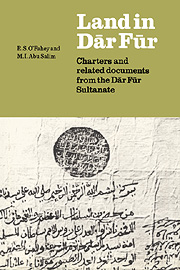Book contents
- Frontmatter
- Contents
- Preface and acknowledgements
- List and concordance of documents
- Transliteration and abbreviations
- Chapter 1 The Dār Fūr Sultanate
- Chapter 2 Estate and privilege
- Chapter 3 Literacy and Chancery
- Chapter 4 A Diplomatic Commentary
- Chapter 5 Translations and Commentary
- Sources and bibliography
- Notes
- Indices
Chapter 3 - Literacy and Chancery
Published online by Cambridge University Press: 16 November 2009
- Frontmatter
- Contents
- Preface and acknowledgements
- List and concordance of documents
- Transliteration and abbreviations
- Chapter 1 The Dār Fūr Sultanate
- Chapter 2 Estate and privilege
- Chapter 3 Literacy and Chancery
- Chapter 4 A Diplomatic Commentary
- Chapter 5 Translations and Commentary
- Sources and bibliography
- Notes
- Indices
Summary
Official literacy
As the sultanate grew and became more centralized, so its administrative system became more literate. But official literacy was not only a function of centralization, it was also the result of Islamization, if only because the bearers of literacy were the fuqarā' or holy men. Their imprint is made manifest not least by the numerous Qur'ānic echoes to be found in the documents that follow. By the nineteenth century, routine administrative letters were issued not only by the sultans and the great chiefs but also by the district and local chiefs. Equally letters were exchanged about what would seem to have been comparatively minor matters.
While all that was written was written in Arabic the spoken language of the court was generally Fur. Although the sultans and their courtiers usually knew both languages, Fur was preferred as the spoken language. It would, however, be very difficult to deduce this from the documents themselves, where only a handful of Fur titles and placenames appear in the Arabic script. This functional bilingualism remained until the end of the sultanate; even 'Alī Dīnār, who apparently knew enough Arabic to compose a poem in praise of the Prophet, Dictated his correspondence in Fur which was taken down directly into Arabic. Whatever the spoken language of daily life and administration, be it Fur or one of the other languages current in Dār Fūr, all official correspondence was in Arabic and, unlike West Africa, seemingly no attempt was made to reduce any of the local languages to writing.
- Type
- Chapter
- Information
- Land in Dar FurCharters and Related Documents from the Dar Fur Sultanate, pp. 22 - 25Publisher: Cambridge University PressPrint publication year: 1983
- 1
- Cited by



